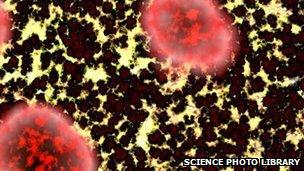Estimate doubled for vCJD carriers in UK
- Published

Twice as many Britons as previously thought could be carrying the human form of "mad cow" disease, variant CJD.
Researchers believe one in 2,000 people in the UK is a carrier of the disease linked to eating contaminated beef.
Their estimate in the BMJ comes from studying more than 32,000 samples of human tissue removed during appendix operations carried out between 2000 and 2012 at 41 hospitals.
It remains unclear if any of these carriers will ever develop symptoms.
Early predictions of a vCJD epidemic didn't come to fruition.
To date, here have been 177 UK deaths from vCJD. Most of these occurred in the late 90s and early 2000s. There has been only one death in the last two years.
The rare, fatal disease progressively attacks the brain.
But it appears that relatively few who catch the infectious agent that causes the disease develop symptoms. People can be "silent" carriers for decades and not even know it.
The BMJ research identified 16 such carriers out of the thousands of appendix tissue samples studied.
Experts say many vital questions remain unanswered.
Since the link between vCJD and bovine spongiform encephalopathy (BSE), known as mad cow disease, was discovered in 1996, there have been strict controls to prevent meat from infected cattle from entering the food chain.
However, the average time it takes for the symptoms of vCJD to occur after initial infection is still unclear.
Preventing spread
This means people exposed to infected meat before the food controls were introduced continue to develop variant CJD, and may spread it to others.
Experience tells us that the disease could be transmitted from human to human via blood - in the UK, there have been three reported cases of vCJD associated with a blood transfusion.
Blood donor services take measures to ensure blood is not infected but there is no test to screen for vCJD, although scientists are working on this.
And there is currently no cure for the disease.
Prof Sebastian Brandner of University College London, who led the BMJ research, said: "We do not know what will happen.
"Will these people develop disease and can they transmit it? There are many questions we still do not know the answers to."
Prof Richard Knight, director of the National CJD Research and Surveillance Unit in Edinburgh, said the answers might not be known for decades.
In the meantime, surveillance was key, he said.
"You can see from the data available that its likely that we will get a secondary or tertiary wave of disease but its likely that these further waves will be small.
"Future clinical cases will be pretty small in number," he added.
Dr Graham Jackson, of the MRC Prion Unit at UCL Institute of Neurology, said: "Given the high levels of infection indicated by this research, it is now crucial we establish how many people in the UK harbour that infection in their bloodstream in order to adequately assess the risks of transmission through contaminated blood donations.
"Studies to develop new blood tests for CJD must remain a priority to assist with screening and protecting the UK blood supply."
- Published19 July 2013
- Published3 February 2011
- Published15 February 2013
- Published20 October 2000